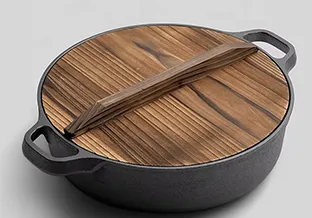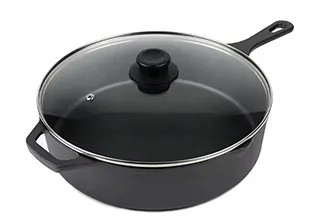
1 月 . 26, 2025 04:11
Back to list
different types of dutch ovens
Exploring the diverse world of Dutch ovens reveals a realm where traditional craftsmanship meets modern culinary innovation. Each type of Dutch oven offers unique benefits, inspiring both amateur cooks and seasoned chefs to expand their culinary repertoire. A true culinary essential, the Dutch oven is revered for its versatility and enduring construction, making it a staple in kitchens worldwide.
Stainless Steel Dutch Ovens The evolution of Dutch ovens has introduced stainless steel variants, known for their corrosion resistance and stylish, modern appeal. While they lack the heat retention capability of cast iron and the aesthetic array of enameled options, stainless steel Dutch ovens are excellent for searing and deglazing, similar to quality frying pans. They provide a professional edge to Dutch oven cooking, appealing to those who value a modern, sleek look as much as function. Their lightweight and easy-to-clean nature make them a favored choice for a quick and efficient cooking process. Copper Core Dutch Ovens For professionals and serious home cooks seeking precise temperature control, copper core Dutch ovens integrate copper within layers of stainless steel. This combination allows for rapid heat conduction and adjustability, offering unmatched control over cooking methods and temperature. While the investment is higher compared to other models, the craftsmanship and performance justify the price tag for those passionate about culinary exactness. Trusted brands offering copper core options lend authority to these premium Dutch ovens, delivering a blend of aesthetic beauty and professional functionality. Choosing the right Dutch oven requires a blend of understanding culinary needs, personal style preferences, and the type of cooking one enjoys. The variety available today ensures that whether you prioritize the rich tradition of cast iron, the vivid appearance of enamel, or the modern efficiency of stainless and aluminum, there is a Dutch oven that will elevate your cooking experience. Cooking with Dutch ovens transcends mere food preparation; it is about embracing a tradition that combines expertise, authority, and reliability, creating a culinary journey that evolves with each simmering pot. As you embark on this journey, consider the experiences shared by countless chefs and home cooks who have trusted Dutch ovens to deliver warmth, flavor, and nourishment. An investment in the right Dutch oven is an investment in a rich culinary heritage, where expertise and trust blend seamlessly to enhance the art of cooking. Whether simmering a hearty stew or baking bread to perfection, Dutch ovens remain an unparalleled tool in the kitchen arsenal, embodying a legacy of quality that continues to inspire cooks around the world.


Stainless Steel Dutch Ovens The evolution of Dutch ovens has introduced stainless steel variants, known for their corrosion resistance and stylish, modern appeal. While they lack the heat retention capability of cast iron and the aesthetic array of enameled options, stainless steel Dutch ovens are excellent for searing and deglazing, similar to quality frying pans. They provide a professional edge to Dutch oven cooking, appealing to those who value a modern, sleek look as much as function. Their lightweight and easy-to-clean nature make them a favored choice for a quick and efficient cooking process. Copper Core Dutch Ovens For professionals and serious home cooks seeking precise temperature control, copper core Dutch ovens integrate copper within layers of stainless steel. This combination allows for rapid heat conduction and adjustability, offering unmatched control over cooking methods and temperature. While the investment is higher compared to other models, the craftsmanship and performance justify the price tag for those passionate about culinary exactness. Trusted brands offering copper core options lend authority to these premium Dutch ovens, delivering a blend of aesthetic beauty and professional functionality. Choosing the right Dutch oven requires a blend of understanding culinary needs, personal style preferences, and the type of cooking one enjoys. The variety available today ensures that whether you prioritize the rich tradition of cast iron, the vivid appearance of enamel, or the modern efficiency of stainless and aluminum, there is a Dutch oven that will elevate your cooking experience. Cooking with Dutch ovens transcends mere food preparation; it is about embracing a tradition that combines expertise, authority, and reliability, creating a culinary journey that evolves with each simmering pot. As you embark on this journey, consider the experiences shared by countless chefs and home cooks who have trusted Dutch ovens to deliver warmth, flavor, and nourishment. An investment in the right Dutch oven is an investment in a rich culinary heritage, where expertise and trust blend seamlessly to enhance the art of cooking. Whether simmering a hearty stew or baking bread to perfection, Dutch ovens remain an unparalleled tool in the kitchen arsenal, embodying a legacy of quality that continues to inspire cooks around the world.
Previous:
Next:
Latest news
-
Extra Large Round Cast Iron Griddle - Heavy Duty Griddle Plate for Even Heating & Versatile CookingNewsJun.10,2025
-
Top Brands of Cast Iron Cookware Durable & Versatile Cast Iron Skillet BrandsNewsJun.10,2025
-
Enamel Coated Cast Iron Pot Durable, Non-Stick & Even Heat CookingNewsMay.30,2025
-
2 Quart Dutch Oven Durable Cast Iron, Even Heating & VersatileNewsMay.30,2025
-
Best Chinese Wok Price Authentic Iron Pans, Fast Shipping & DealsNewsMay.29,2025
-
Non-Stick Cast Iron Skillet with Lid Durable & Easy-Clean PanNewsMay.29,2025


